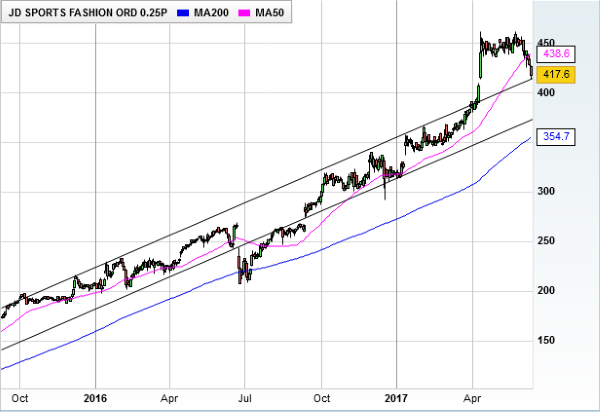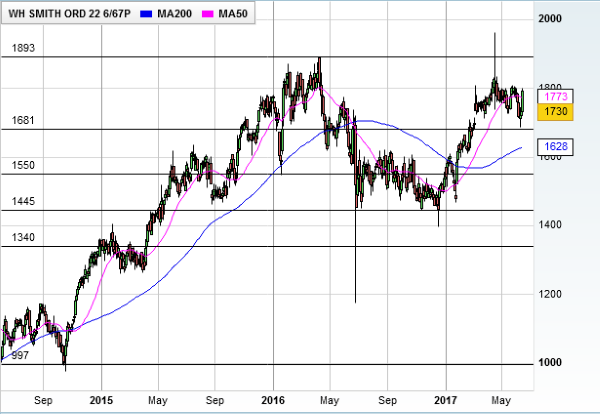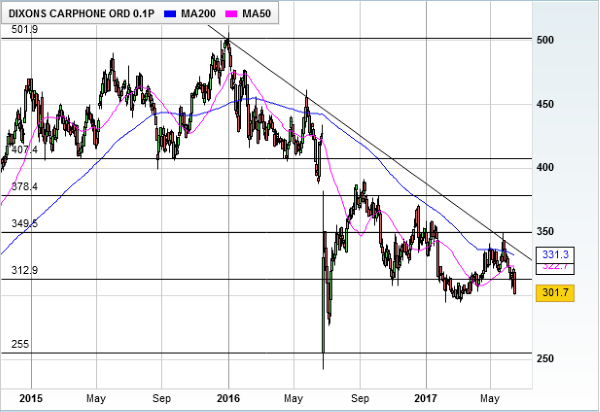The high street's not dead: The retail stocks to own
16th June 2017 16:14
Is the writing on the wall for UK general retailers? Retail sales data from the Office for National Statistics (ONS) published Thursday certainly painted a gloomy picture, with year-on-year growth in sales volumes of 0.9%, its lowest since April 2013.
It's no surprise – inflation, up to 2.9% in May from 2.7% in April, is far outpacing wage growth of 1.7%, and retail prices are also increasing, meaning consumers are becoming increasingly stretched. That threatens to choke discretionary spend.
Judging by profits warning this week, this is not a new trend. The sofas-to-beds retailer had already predicted a softening of the market in the short term – though it underestimated the scale of the problem.
The firm saw a fifth of its value wiped off in the aftermath, and others were dragged down between 4% and 7% - in fact, the general retail sector was a sea of red Thursday.
While DFS says this is a market-wide issue, broker UBS points out that reading too much into its warning to inform views on the wider retail sector is likely to be futile, asserting that DFS's average transaction value is £1,500, whereas and B&Q are closer to £30.
It's also heavily exposed to Bank Holiday weekends, the next of which in August falls into the next financial year, while the timing of DFS's year-end is also "unhelpful", says analyst Andrew Hughes.
The uncertain political environment is also a potential headwind, with no party gaining a parliamentary majority. While the Conservatives are currently thrashing out a deal with Northern Ireland's DUP, they are vulnerable.
With Labour now ahead in the polls, Jeremy Corbyn could well be prime minister by the end of 2017. All businesses would face higher corporation tax and national minimum wage.
But UBS believes there will be winners in the retail sector if this does play out, with the mass market and value companies set to benefit at the expense of higher-end retailers and luxury goods and services.
"With operational gearing of about 3 times, the benefit from higher demand could over time offset the impact of higher corporation tax," Hughes explains.
"With value retailers already relative winners from current pressures on disposable income from FX, it would appear they could be beneficiaries irrespective of the political backdrop of the UK."
Many predict doom and gloom on the high-street, though, and Julian Chillingworth, chief investment officer at Rathbones, is no fan, at least from an investment angle. In fact, he explains, it's not only retailers that will suffer from lower consumer spending, but leisure experiences full stop.
Combine this with the ever-increasing challenge from online retailers like , and , the latter of which once again reported stellar numbers last week, and the death knell for the high street has been sounded, he says.
But Nathan Sweeney, senior investment manager at Architas, is more sanguine, arguing that inflation has peaked, though retail figures are a "worrying sign".
Still, 16 companies out of 30 in the general retailers sector are showing gains for the year-to-date, including (just!).
| Best performers in FTSE All-Share General Retailers sector YTD | ||||
|---|---|---|---|---|
| Rank | Company | Ticker | Market cap (£m) | Return (%) |
| 1 | JD Sports Fashion | JD | 4,077 | 32 |
| 2 | Carpetright | CPR | 127 | 23 |
| 3 | N Brown | BWNG | 774 | 23 |
| 4 | B&M European Value Retail | BME | 3,390 | 22 |
| 5 | Card Factory | CARD | 1,046 | 21 |
| Source: Sharepad. Data from Close 31/12/2016 to close 15/06/2017 | ||||
And plenty of savvy stockpickers see value in parts of the sector. We saw last week how AIM-listed has gone from strength to strength since floating a year ago.
Dan Adams, senior investment analyst at Psigma, is optimistic, but warns that it's important to be selective. With valuations cheap, "we believe that it is a minefield of value traps out there", he says.
James Illsely says the fund he manages, the , focuses on picking stocks rather than taking big sector bets. That's why he's able to identify cheap companies with share price and earnings momentum that are highly cash generative.
Before, having scale and big marketing budgets was key for fashion retailers. Now, online offerings are needed and "marketing and brand perception is driven as much by social media than traditional marketing".
"A lot of the bricks and mortar estate was built for a different environment and different cost structures at a time when a growing amount of spend is moving online and that's a very fast-moving challenge."
So, who will flourish now? Here are some of the best ideas in the space from fund managers and investment experts who know.
JD Sports
We're a big fan of and it's a company that has delivered year in, year out for investors. And for Illsely it's a long-standing holding. He argues that so-called 'athletic retailing' is a growing market segment and JD Sports is the best example of it in the UK.
It's capturing a change in consumer behaviour, he says, with millennials and the younger generation happy to pay a premium for "affordable luxury" products from Nike and Adidas.
"It's growing very rapidly, it's got a high brand awareness, it's got great strategic relationships with the likes of Nike and Adidas and it's got a smaller market size in the UK than so it's got room to grow and has been growing," he explains.
Add to that a cautious plan for expansion into "incredibly fragmented" international markets, where JD's relationships with the major brands will give it an edge over small chains on the continent, plus strong earnings momentum, and Illsely thinks there's further share price upside.
"For the end of 2018, earnings forecast have gone from around 16p to over 21p in the last 12 months, so forecasts have been rising very rapidly. [That] is an indication that the company's got a great tailwind behind it and that trend towards fashion retailing has got a lot further to run."
Shares hit a record high of £4.50 after an excellent set of full-year results in April, taking gains to over 1,700% in the past eight years. Since then a lack of catalysts has seen it drift lower.

WH Smith
is another long-standing holding of the JPM UK Equity Core fund and, like JD, it is currently positioning itself away from the UK high street.
The newsagent now makes more money from its UK and international travel division – stores in train stations and airports – than it does from the high street. And profits in the former are "growing rapidly", Illsely points out.
He asserts that the newsagent is "exploiting a niche", impulse buying, that cannot be utilised by the online retailers: "You can't get a delivery in the airport when you're just about to fly to Malaga."
It's another growth area for a firm that has trebled in value over the course of the last decade, and analysts at Barclays recently promoted the stock to its European "Top Picks" portfolio, along with fellow high-street favourite .
The broker's target price of 1,990p suggests there's plenty more to come from Smiths. "We believe that UK high street performance will be resilient, and sustained capacity growth from airlines will help underpin robust like-for-likes in UK travel," analyst Richard Taylor explained.
"In the long term, we believe that the international travel division will be a key driver and could ultimately eclipse the profitability of the UK travel division given the small current market share and building track record of contract wins."
It's another that has traded sideways in recent months after a strong start to the year and was hit more than JD Thursday, sinking more than 3.5%, although still up year-to-date.

Dixons Carphone
As mentioned, Psigma's Adams is conscious of "sounding the death knell on the industry" and fancies there'll be winners. "Those with unique business models should continue to flourish," he explains, picking out as an example.
Psigma remains positive on the electronics retailer, which was borne out of a merger between Dixons and Carphone Warehouse three years ago, noting that it benefits from the huge cost savings from store consolidation resulting from that merger.
Adams says: "Their new size and structure means that they can closely match Amazon on pricing but offer the added benefit of instore technical advice for the non-tech savvy.
"On a forward price/earnings ratio of around 10 times, it provides one with an opportunity to buy 'best-in-class' in an out of favour sector."
UBS cites Dixons' sale of its joint venture with US company Sprint as a hurdle to overcome with regards to profits, noting that while it's too early to be sure of the profit implications, "it may be optimistic to expect the $40-50 million (£31-39 million) profit target in FY20 will be achieved solely from the provision of Honeybee services".
"The removal of one area of profit growth over the medium term is unhelpful," says Hughes. "We are now more reliant on [competitor] MediaMarkt withdrawal from Sweden, another connected world services deal or more robust trading in the UK.
"Stronger trading is possible this year, given a double-header of handset launches, although we see a risk that political uncertainty will have some near-term impact on demand across the board for big-ticket items."
However, it was one of the biggest losers Thursday, 5.7% down, and is well down on its peak of £5 in early 2016.

Inchcape
While may not be quite as well-known as the other three, the cardealer has been a stalwart of Illsely's fund and is still a favourite.
It operates in 29 countries worldwide and, like JD, "is trusted by premium luxury retailers to promote their products in a high-quality way, especially in some of the small markets where it might be the exclusive distributor".
It enjoys good relationships with some blue-chip brands such as Bentley, Jaguar, Aston Martin and Porsche, as well as more affordable Fords, Toyotas and Suzukis.
Illsely explains that in bigger countries like the UK, it makes as much from used car sales and aftersales as it does selling the product in the first place.
"It's growing very strongly; it had something like 8% growth in constant currency last time it reported," he added. "That international angle protects it from some of the uncertainty around the UK, so that's attractive for us."
This article is for information and discussion purposes only and does not form a recommendation to invest or otherwise. The value of an investment may fall. The investments referred to in this article may not be suitable for all investors, and if in doubt, an investor should seek advice from a qualified investment adviser.
Editor's Picks